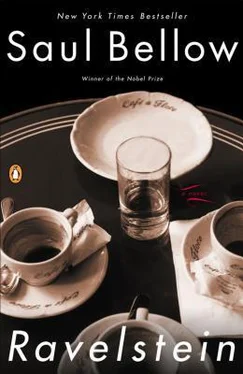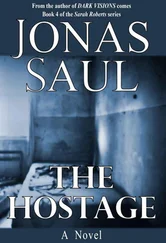The relief registered by our sternly handsome landlady said it all. How pleased, how proud she was of getting rid of me. Let him go and die elsewhere-in a taxi or a plane. She got up before dawn to see us off. The French neighbors also turned out. They must have been awakened by the ambulance the night before with its sirens and flashing lights. With kind hearts and sorrow they wished us well and waved goodbye. Decent people, after all. The landlady's goodbye signified "Get lost." In her place I might have agreed. In the five-o'clock light she waved goodbye-well out of that!
Rosamund, speaking of our foiled holiday, said, "What a night mare." In the rattling speeding taxi, she said goodbye to the island with a kind of wild relief. She was at least going to be rid of the masked motorcyclist who once or twice a week took over the main street. He was all gotten up in leather and a Buck Rogers helmet.
His big teeth were bared and set. The police disappeared when he made his sweep. People scattered when he came flying. He roared back and forth in storms of dust, and he'd surely kill the pedestrians. "The town crazy man," Rosamund called him. "I won't have him to worry about, coming and going to the pharmacy," she said.
At the vast green metal shed of the airport covering thousands of square feet, Rosamund helped me, the sick man, into the waiting wheelchair. I sat in it, feeling imbecilized, and signed traveler's checks in my lap, to pay the exit fees. I felt I didn't actually need a wheelchair. I was still able to walk, I said to Rosamund, and gave her a demonstration by climbing the many stairs into the aircraft. Then down again in San Juan, where I fell gratefully into the second waiting wheelchair. Most of the luggage was piled around my feet and on my knees. But then there was the passport inspection, for which I had to stand up. Worst of all was the customs examination. Rosamund had to get the large suitcases and garment bags from the carousel to the inspection tables-open them, answer questions, then lock them again and haul them down to be reloaded for the U. S. flight. She didn't have the male grip, the necessary muscle. And here I discovered that once and for all I was no longer the able-bodied passenger I once had been. Rosamund said to the inspectors that I was unwell, but they didn't particularly heed her.
It was Thanksgiving Day and the plane was more than half empty. The attendant said I might want to stretch out and led us to the rear, where she pushed back the arms of a row of seats. I asked for water and then more water. I had never been so thirsty. The chief steward, who had dengue in the South Pacific during the war, had many savvy things to say. He offered to give me oxygen. Rosamund urged me to take it but I asked only for more water.
She, meanwhile, was trying to reach my Boston doctors on the telephone. There were two of these-the "primary" one and the cardiologist. The cardiologist, on the golf course, couldn't be reached; the "primary' doctor had gone to New Hampshire for a family dinner.
I recall during the flight I began again to talk about the young friend of Grielescu who was murdered in a stall of the men's room.
"You've already told me about him."
"When was that?"
"Not very long ago."
"I don't seem to be able to rid my mind of him. I won't mention him again. But I think I've connected him to Ravelstein, somehow. You see, I didn't like Grielescu but I did find him a funny man, and to Ravelstein this was a cop-out, and it was also characteristic of me. To say he was amusing was to give him a pass. But he was suspect-thought to be in league with killers. I can't seem to get a tight grip on the meat-hook people."
Rosamund tried hard to be attentive. She encouraged me to talk. She was worried sick.
"He died in the middle of the act-easing himself. They shot him at close range. Ravelstein believed that it was one of my typical errors…."
"Was he saying that Grielescu was tied in with murderers?"
"Exactly. He said that I should have known better."
"But this murder took place after Ravelstein died."
"He had made the right call, nevertheless. This famous bookish scholar Grielescu, he was saying, was after all a Nazi." Trying to get me off the Grielescu merry-go-round, Rosamund said, "What common ground did you share?"
"He used to quote me to myself." He had dug up a statement I had made about modern disenchantment. Under the debris of modern ideas the world was still there to be rediscovered. And his way of putting it was that the gray net of abstraction covering the world in order to simplify and explain it in a way that served our _cultural__ ends has become the world in our eyes. We needed to have alternate visions, a diversity of views-and he meant views not bossed by ideas. He saw it as a question of words: "values,"
"life styles,"
"relativism." I agreed, up to a point. We need to know-our deep human need, however, can't be satisfied by these terms. We can't climb out of the pit of "culture" and the "ideas" that supposedly express it. The right words would be a great help. But even more, a gift for reading reality-the impulse to put your loving face to it and press your hands against it.
"But then, from left field, or do I mean right field, Ravelstein urges everyone to read Celine. Well, by all means. Celine was wildly gifted, but he was also a wild lunatic, and before the war he published his Bagatelles pour un massacre. In this pamphlet Celine cried out against and denounced the Jews who had occupied and raped France. To many in France, it was Jewry that was the enemy, not Germany. Hitler-this was in 1937-would liberate France from the Jewish occupation. The English, who were allied with Jewry, plotted with it to destroy _la France__. It had already become a Jewish house of prostitution. _Un lupanar Juif-Bordel de Dieu__. The Dreyfus Case was brought back again. The authorities received millions of poison-pen letters from anti-Dreyfusard Jew-haters. I agreed with Ravelstein that Celine wouldn't pretend that he took no part in Hitler's Final Solution. Nor would I trade the short-stop Grielescu for the right-fielder Celine. When you put it in baseball lingo you can see how insane it was."
Rosamund was humoring me. I had never been quite so sick as this. And it never occurred to me that I was sick. Unwell, yes; it was obvious that I was out of order. But I had lived long enough to be able to say that I was not dying but ailing. A reactionary secret society might determine that the time had come for you to die-a camarilla of your countrymen voted that you must be assassinated. And so a study was made of your program. This would be described as political but in fact it was the will to viciousness. An erratic playboy scholar who had regular habits sat down to attend to a natural necessity-the daily thing-and was shot by an assassin in the next cubicle and died in an instant.
Rosamund was all for going from the airport direct to the hospital.
But I insisted on heading for home. Once in bed I'd be okay. Of course, I couldn't see myself. I was past knowing how high my fever was-bent on showing how perfectly well I was. Rosamund gave in and stacked our bags and boxes into the trunk of the cab. At the other end of the ride it was obviously out of the question to haul the luggage upstairs after the fare was paid, and the driver, seeing trouble, took his money and rushed away. Our trouble was obvious to him, but not to me. I crept upstairs and got into bed.
"Glad to leave that vile isle," I said to Rosamund. "Can it still be the same day? Is it about twelve? We took off at dawn. 'The hand of time is on the prick of noon,' as Mercutio said-one of Ravelstein's favorite lines from Shakespeare."
Under my blankets feeling safe and well, I told Rosamund that a good sleep was all I needed. But it was early afternoon-not bed time. Rosamund couldn't agree that sleep was the answer. By some faculty invisible to me she recognized that I was in desperate trouble. "You would have died in your sleep," she later said, and she went on trying to reach the doctors. "Thanksgiving is a family day-it's playtime, golf-time."
Читать дальше












